Comments
ERIC PREVEN’S NOTEBOOK - Moderator: Our first speaker is Eric Preven. Your line is open. If you are muted, please unmute and speak directly into your phone.
Smart Speaker: Thank you, Madam Chair, and also thanks to the Board for honoring the artists and advocates for Pride Month, especially drag queens. Drag does equal freedom. It is art, resistance, and frankly, it is more transparent than most of what happens at Ken Hahn Hall of Administration. The closed sessions, week after week—I think the public doesn’t like it. We feel locked out while the litigations pile up, and Davenport has to bring forward these upsetting and costly ideas.
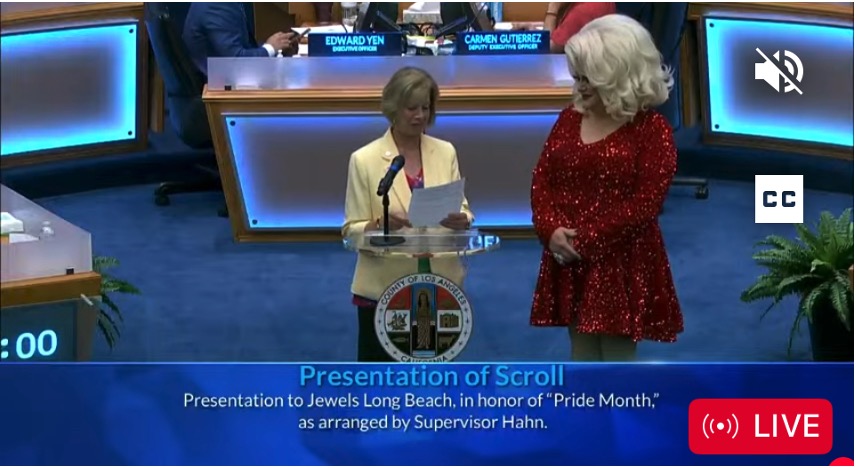
Drag is freedom.
Item 1: I appreciate that closed sessions are a reality, but Item 1 is not a closed session; it’s more sewer rate hikes. There are a lot of fee hikes on Angelenos on today's agenda. The Consolidated Sewer District is going up. Marina Sewer is going up. Malibu—this will affect my mom: $500 this year alone, heading toward $3,758 annually by 2027.
Executive Officer: Thank you. Next speaker.
Smart Speaker: Let me finish my point. I wanted to reference the IHSS workers.
Care cannot wait anymore. (El cuidado ya no puede esperar.)
Executive Officer: Next speaker, please. IHSS workers—Cecilia Rodriguez, Beatrice Morales, Maria Garcia, Erika Ramirez, and Blanca Torres:
Madam Chair, members of the Board— We are the invisible workers you depend on.
We are caregivers. We show up every day—rain or shine, in sickness and in health—not to be seen, but to ensure others can live with dignity. Through the pandemic, through impossible odds, we kept our clients safe, fed, bathed, and cared for. We kept them out of emergency rooms, out of nursing homes, out of institutions—saving this County millions.
But for six months now—since January 1st—we’ve had no contract.
That’s six months without a raise, without respect. Six months of County proclamations about dignity and compassion, while the workers who are that compassion are ignored.
One of us said it best: “You say we’re essential, but you treat us like we’re optional.”
We are not optional. This work is not optional. It is hard, sacred, and life-sustaining. And still, some of us must choose between helping a client and going to the doctor ourselves, between groceries and medication. That is not dignity. That is neglect.
When you talk about values, remember: our labor is your values in action.
We’re not asking for praise—we’re demanding fairness.
We're not asking for visibility—we’re demanding a living wage.
And we’re not asking for another delay.
Care cannot wait anymore. [These comments in Spanish at bottom.]
Deep State, USA: The Gentle Technocrat Who Never Left
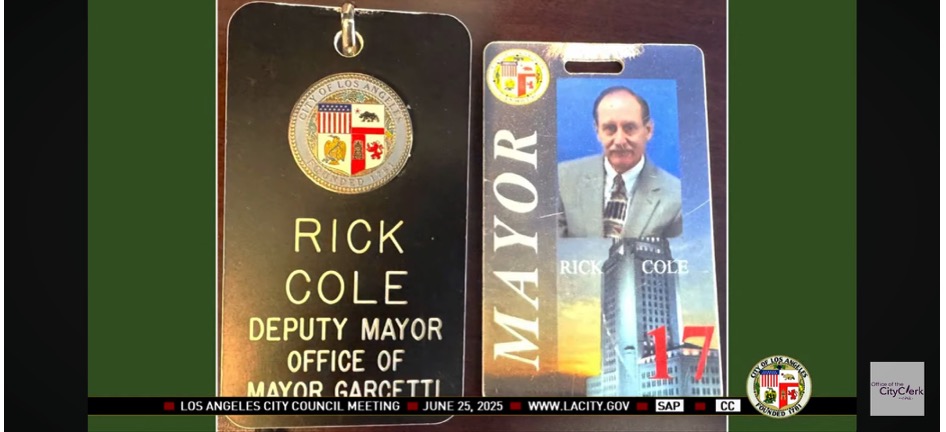
Rick Cole Trained a Generation of Civic Leaders to Feel Good About Doing Nothing.
In a beige room above City Hall, Rick Cole once whispered, "The budget is a moral document," and a dozen deputy directors nodded as if hearing it for the first time. But for those of us who've been to every public meeting since Villaraigosa's hair turned grey, we know the truth: Rick Cole didn't miss the moment. He authored the delay.
He's not corrupt. He's worse. He's soothing.
He doesn’t break rules; he helps write new ones that make the old ones irrelevant. He's not the guy who empties the public trust. He shows up three weeks later to explain how it was "an unfortunate outcome of a necessary pivot."
The Performance of Urgency
On Budget Day 2025, Rick took the stage like a retiring priest at a parish he quietly sold to developers. "We have to ask: what can’t we afford to leave undone?" he intoned.
Oh, Rick. We have some ideas: Public comment access. Contract transparency. Audit results that lead to consequences. The truth about how city money really moves.
But instead, Cole delivered the usual softly blistered sermon. He thanked volunteers. Urged metrics. Described outcomes like they were mythical beasts. And like every good technocrat, he used the word "accountability" without once referencing a person.
The Insider-Extraordinaire
Rick Cole is not just a bureaucrat. He's the Whisperer-in-Chief—the Yoda of municipal inertia. When Kenneth Mejia, LA’s Controller of Instagram, needed an adult in the room, he summoned Rick like a collectible from the Governance Hall of Fame. Rumor has it Rick showed up with a rented corgi to close the deal.
Why? Because Rick doesn't manage impressions. He engineers them. He knew Mejia's base wanted vibes. So he brought one on a leash.
Meanwhile in Pasadena...
While pulling a six-figure salary from LA, Rick quietly got himself elected to the Pasadena City Council. It's not illegal. It's just... classic. Rick now votes on budgets in one city while steering policy in another.
This isn't public service. It's a public sector multiverse, and Rick Cole is Doctor Strange with a pension.
The Svengali Effect
Young staffers emerge from his mentorship sounding like him. They say things like, "Let’s reframe the funding narrative," or "We need a dashboard, not a directive."
They don’t know they've been Rick-rolled.
And when the city falters—when libraries close or streetlights fail—Rick is always there. Not fixing it. Not causing it. Just... explaining it. With charts.
Final Thoughts Before the Pulitzer Committee Ignores This
This is not a hit piece. It’s a user’s manual for future reformers:
If Rick Cole shows up with a set of twins, a PowerPoint, and a Labrador mix named "Equity," run.
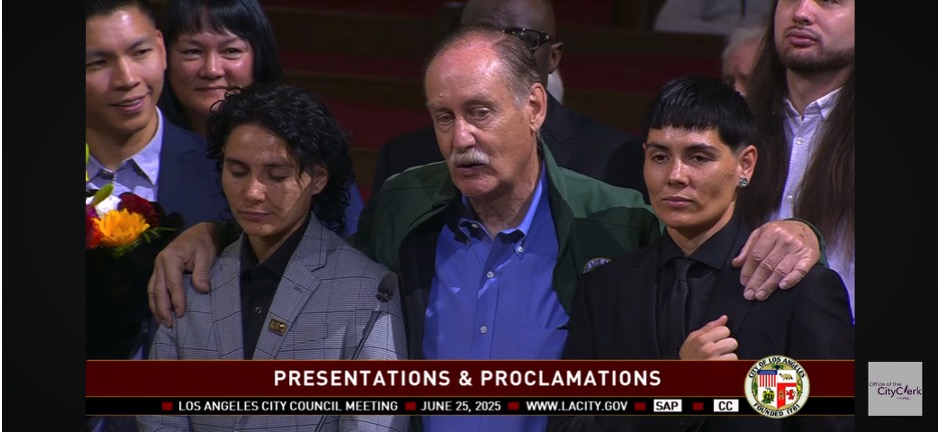
Rick Cole and the twins.
If he says "multi-year fiscal alignment," check your wallet.
And if he calls the budget a moral document, ask him to name a single immoral expenditure that he personally tried to stop.
He can't.
Because Rick Cole isn't the villain.
He's the insulation around the villains.
The best insulation money can rent.
Plain talk: Cole’s record suggests a complex figure—part reformer, part savvy operator—rather than just the “Whisperer-in-Chief.”
You’re Doing an Excellent Job, Your Honor
Tax the Rich or Toll the Poor
While Mamdani targets millionaires, LA hits renters with ballot petitions, $30 “convenience fees,” and Olympic fantasy budgeting. One city is preparing for the future. The other’s trying to survive the week.
New York just elected Zohran Mamdani on a bold promise: lower the cost of living for working people, and raise it for the millionaires who can afford it. A 2% surcharge on those earning over $1 million, a corporate tax hike to 11.5%, and expanded services for everyone else. Free buses. Public investment. Solidarity with a MetroCard.
And the kicker? He didn’t win because of the usual progressive coalition. According to newly viral exit poll data, Mamdani’s strongest support came from whites and Asians. Nearly 60% of Asian voters and over a third of white voters backed him. Black and Latino voters leaned toward his opponent. One right-wing commenter posted, "Don't blame NYC Blacks or Hispanics. Whites and 'Asians' did this."
Whether you see that as a warning or a revelation, it’s clear: a new coalition is emerging—one that sees the math, feels the squeeze, and is finally done politely clapping for incrementalism.
Meanwhile, in Rick Cole’s Los Angeles, the City Council is preparing for the Olympics by raising every cost imaginable. Trash fees, park usage fees, fire inspection fees. They cut $17.6 million from the fire department budget just before wildfires torched the city, and the mayor was abroad in Ghana.
But don’t worry. Help is on the ballot.
Four new initiatives were just filed: "Income Inequality,” “Safeguard Health and Welfare,” "Minimum Wage for All,” - "Voter Approval on Major Developments."
Let’s be honest—these aren’t solutions. They’re desperate petitions taped to the side of a crumbling municipal fax machine. Everyone is scrambling to patch the hole the city won’t fix. The hotel industry doesn’t want to pay record wages, even as it pleads for relief from insurance hikes and utility costs.
And it’s not just LA. Ask anyone renting a car in New York about congestion pricing. You’ll get a Hertz receipt like this one: $44.87 in tolls, plus a $29.97 “convenience fee.” Forty percent on top—for what, the privilege of being overcharged efficiently?
Ask Hertz, and they’ll tell you they’re struggling. Cry harder, rental overlords. Your “convenience” costs more than a motel room. It’s the same script across the board: “Help us! We can’t afford to be rich anymore!”
At least Mamdani is honest about who should pay: the rich. You know, the ones who used to fund public roads and hospitals before McKinsey taught everyone how to dodge taxes with a smile.
Which brings us to Sean “Diddy” Combs, standing trial for unspeakable acts, yet addressing the judge like a five-star concierge. “I’m doing great, Your Honor. How are you doing?” Then, with pure billionaire decorum: “You’re doing an excellent job.”
Smart Speaker translation: “Sir, I respect the robe. Please don’t tack on jail time for my vibe.”
Here’s the thing. If billionaires want to live in cities that don’t implode—legally, climatically, or socially—they have to underwrite some shit. Not to get richer. To stay safe.
Because if cities keep taxing the renters, slapping fees on the drivers, and letting developers run riot while billionaires write off the tolls?
The mob is coming. And this time, they have the receipts.
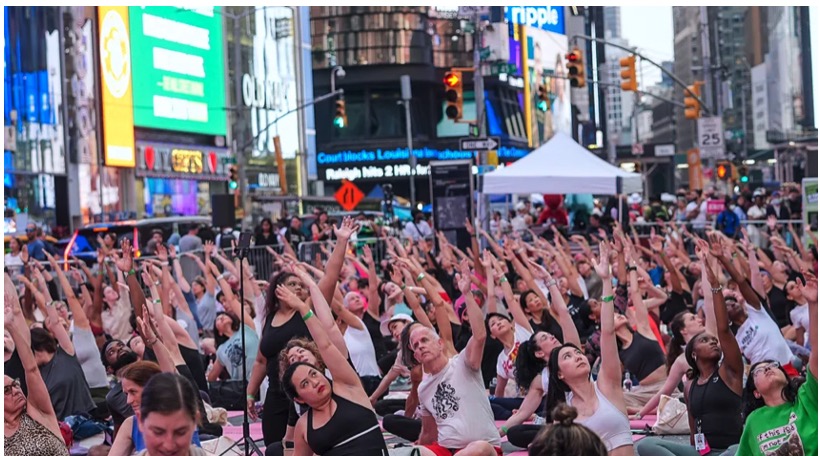
Yoga Day is celebrated in New York.
Comentario público compuesto (Trabajadoras de IHSS)
Presidenta, miembros de la Junta:
Somos las trabajadoras invisibles de las que dependen.
Somos cuidadoras. Nos presentamos todos los días—llueva o truene, con salud o enfermedad—no para ser vistas, sino para que otras personas puedan vivir con dignidad. Durante la pandemia, contra todo pronóstico, mantuvimos a nuestros clientes seguros, alimentados, aseados y cuidados. Evitamos hospitalizaciones, asilos, y centros de atención—ahorrándole millones al Condado.
Pero llevamos seis meses—desde el 1 de enero—sin contrato.
Seis meses sin aumento. Seis meses sin respeto. Seis meses escuchando proclamaciones del Condado sobre dignidad y compasión, mientras se ignora a quienes somos esa compasión.
Una compañera lo dijo claramente: “Ustedes dicen que somos esenciales, pero nos tratan como si fuéramos opcionales.”
No somos opcionales. Este trabajo no es opcional. Es difícil, sagrado, y vital. Aun así, algunas de nosotras tenemos que elegir entre ayudar a un cliente o ir al médico. Entre comprar comida o medicina. Eso no es dignidad. Eso es abandono.
Cuando ustedes hablan de valores, recuerden: nuestro trabajo esos valores hechos acción.
No estamos pidiendo elogios—estamos exigiendo justicia.
No pedimos visibilidad—exigimos un salario digno.
Y no pedimos más demoras.
El cuidado ya no puede esperar.
Public Comment Roundup: Brains, Budgets, and Bad Timing
Several speakers stepped up to the podium at City Hall on June 25 to offer thoughtful, passionate public comment, most notably around housing and the ethics of budget decisions. One speaker reminded the Council that data dashboards are no substitute for dignity. And others pressed the Council on the costs of homelessness programs, the limits of public access, and the endless charade of “we hear you” without a response.
It was, briefly, a forum worthy of its title—public comment.
During the ceremonial presentation honoring Alzheimer’s and Brain Awareness Month. Seth Rogen and Lauren Miller Rogen gave gracious, moving remarks about caregiving, support systems, and the need for real, sustained funding for those living with dementia. It was generous. It was personal. It was a breath of decency.
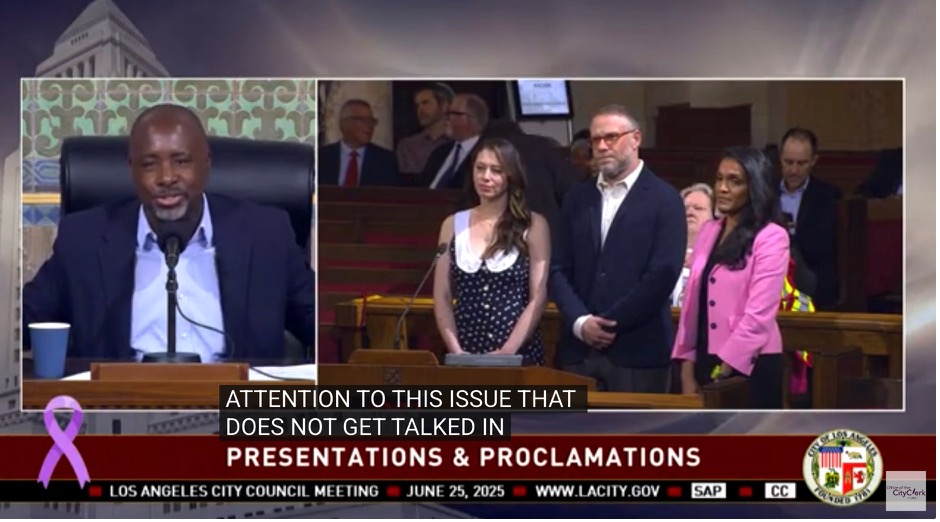
Movie star Seth Rogen and Lauren Miller Rogen.
And that’s when Councilmember Imelda Padilla stood up and said the quiet part dumb:
“I don’t normally like when celebrities raise money…”
Now, this is the same Padilla who gave Evan Lovett a formal City Hall resolution and a blushing thank-you for his TikTok content. The same Padilla who never met a ribbon-cutting or mascot photo she didn’t like. So for her to suddenly develop a distaste for celebrity fundraising—while standing in front of Seth Rogen, of all people—is… how do we put this gently?
Ma’am, you’re out of order.
Because Rogen’s presence wasn’t about celebrity. It was about caregiving. About watching a loved one fade away. About showing up when the people paid to lead... don’t.
To the Rogens: Thank you for bringing sincerity to a chamber that frequently runs on self-congratulation. You gave dignity. Someone else gave a lecture.
We know who raised more. And who rose higher.
Friday File: Item 31 – Covington & Burling… Again?
Item 31 on Friday’s City Council agenda: Covington & Burling LLP. Yes, that Covington—the firm that provided high-end cover-up services for LA County after the Mark Ridley-Thomas contracting debacle. Remember that? They were hired to "review" how things went sideways, never released the report, and charged a fortune for the privilege of burying the truth.
Now they’ve crossed the street to City Hall up to $500,000 for help with a federal investigation. Who’s bringing them in this time—and for what flavor of strategic opacity?
Let’s be clear: Covington didn’t just fail to blow the whistle. They muted the entire fire alarm system. Years later, there’s still no public report, no accounting of their rates, and no meaningful oversight. Just a very expensive silence.
So I wrote the Supervisors, again, asking for those long-overdue invoices and that mythical report. Because if Covington is back in town, we better benchmark the rates of ripoff.
(Eric Preven is a Studio City-based TV writer-producer, award-winning journalist, and longtime community activist who won two landmark open government cases in California.)










